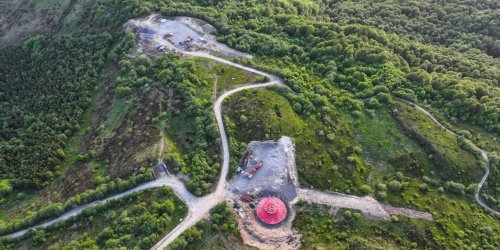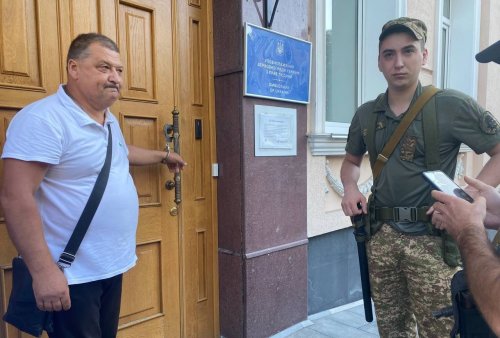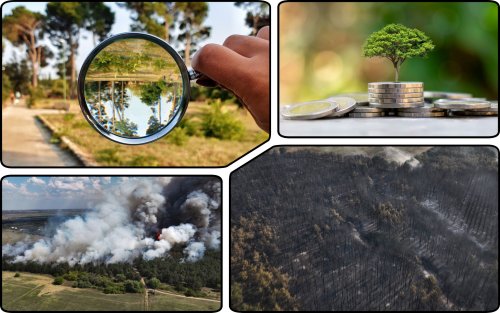The Verkhovna Rada of Ukraine has registered draft law No. 13227-1 “On the Timber Market,” in which the authors propose to exclude all clear and gradual felling of the main use and clear sanitary felling of more than 1 hectare from the scope of environmental impact assessment (EIA).
Activists from the Ukrainian Nature Protection Group (UNPG) and the human rights organization Ecology-Law-Human (EPL) spoke about the hidden threats to the environment.
The draft law is authored by 6 MPs:
- Oleksandr Matusevych – this MP from the Servant of the People has already registered another draft law No. 9516 related to the abolition of EIA for logging. At the time, environmentalists and activists criticized it because of its high corruption and environmental risks. The Verkhovna Rada did not support this legal act.
- Ihor Marchuk, Servant of the People.
- Ihor Fris, Servant of the People, was the initiator of the scandalous draft law No. 12089, known as the draft law “On a bona fide purchaser.” This document caused a wave of outrage among the public. Lawyers and investigators warned that it would allow legalizing any land illegally withdrawn from the ownership of the state or a territorial community if 10 years have passed since such withdrawal. However, despite the fact that citizens collected more than 26,000 signatures on a petition to President Zelenskyy asking him not to sign the bill, the president did so.
- Tetiana Hryshchenko, Servant of the People.
- Mykola Tyshchenko, unaffiliated.
- Mykhailo Laba, Servant of the People.
What risks have experts identified in the draft law No. 13227-1 “On the Timber Market”?
The EPL drew attention to 4 risky proposals from MPs contained in the final and transitional provisions of the draft law:
1. To remove from the scope of EIA all continuous and gradual felling of the main use and continuous sanitary felling of more than 1 hectare.
Experts are confident that this will have unequivocally negative consequences, as “unreasonable, virtually without environmental safeguards, such logging has caused significant negative environmental impacts, caused criticism from scientists and mass protests.”
2. To carry out an environmental impact assessment of forestry development on territories of 20 hectares or more or on territories and objects of the nature reserve fund or in their protection zones of 5 hectares or more only in cases of change of land use.
The EPL says that this actually proposes not to carry out an EIA of forestry development of lands, including lands of the nature reserve fund, if the designated purpose of the land is not changed. The proposed amendment to the legislation, according to experts, opens up opportunities for environmentally unbalanced and even extremely harmful forest plantations in unsuitable natural areas and ecosystems, creation of forest crops unstable to climatic conditions and diseases, destruction of valuable natural complexes, in particular steppe and meadow.
3. Human rights activists believe that “to weaken the unambiguously negative image of the draft law,” the authors propose to introduce an environmental impact assessment for cutting down trees and shrubs over an area of more than 500 m2 in case of a change in the designated purpose of forest land. However, the EPL says that this proposal does not stand up to criticism, since today it is advisable to introduce EIA for the procedure of changing the designated purpose of forest fund lands, including the possible cutting down of trees and shrubs on such lands.
4. According to the activists, the proposed rule that only research institutions and higher education institutions with a forestry profile can be subjects of environmental impact assessment, which will have the right to prepare an environmental impact assessment report in the forestry sector, is also a failure.
They reminded that the current legislation of Ukraine on EIA allows a wide range of entities to prepare reports, including business entities themselves, thus avoiding unjustified costs and market monopolization.
“Therefore, this amendment is also unacceptable and manipulative, as no one prevents business entities from applying to these institutions for EIA, as well as from choosing other institutions or preparing reports on their own,” EPL says.
The organization's experts believe that the proposed changes
- actually weaken the current environmental legislation (on environmental impact assessment, nature reserve fund, biodiversity protection, forestry legislation);
- threaten with long-term negative environmental consequences;
- increase social tensions;
- introduce negative changes to the European vector of development of the Ukrainian legislative framework and “turn us in the opposite direction from our European integration commitments”;
- mislead the European Commission, which has already analyzed the European integration law on EIA and recognized it as compliant with a certain directive.
Who benefits from the proposed changes
The UPG agrees with its colleagues regarding the reservations about the draft law No. 13227-1 “On the Timber Market”. They also emphasize the risks to Ukraine's European progress, as in its latest report on our country's progress, the European Commission emphasized the inadmissibility of expanding the list of projects and works that can be exempted from the EIA procedure. Therefore, the activists emphasized that the proposed legal act contradicts this requirement of the European partners.
The group's activists say that such changes in legislation are actively lobbied by the State Agency of Forest Resources of Ukraine and the State Enterprise “Forests of Ukraine”. In the public space, these institutions have launched a large information campaign about the need to increase timber harvesting. Petro Testov, an ecologist and head of the UPG's analytical department, says that such activity of foresters is related to a large number of questions from woodworkers, caused by the lack of transparency and inefficiency of the state enterprise and agency.
According to the expert, the foresters want to simplify the procedures for assigning logging as much as possible, remove independent control and eliminate the possibility of public influence on their implementation. He reminded that currently, most logging operations require approval from the Ministry of Environmental Protection and Natural Resources of Ukraine or regional military administrations.
Petro Testov says that these institutions “far from always” approve all the plans of foresters, but on the contrary, they force them to follow the rules of felling, take into account the presence of Red Book species, the need to preserve dead wood and biodiversity.
According to the UHF activists, the draft law No. 13227-1 primarily threatens “non-exploitable” forests – those where the state currently limits planned logging. These are the forests of the Carpathians, hard-to-reach forests in swamps and steep slopes, forests within the nature reserve fund, suburban and protective forests.
Petro Testov considers this strategy of foresters to be very short-sighted. He suggests following the example of the Teteriv forestry, which increased logging volumes through artificial forests without affecting natural old-growth forests.
Recently, EcoPolitics reported on media reports about foresters' fraud with the electronic timber accounting system. We also talked about the draft Resolution No. 13297, which would establish a temporary commission to find ways to solve the problems of the forestry, woodworking, and furniture industries in Ukraine.





